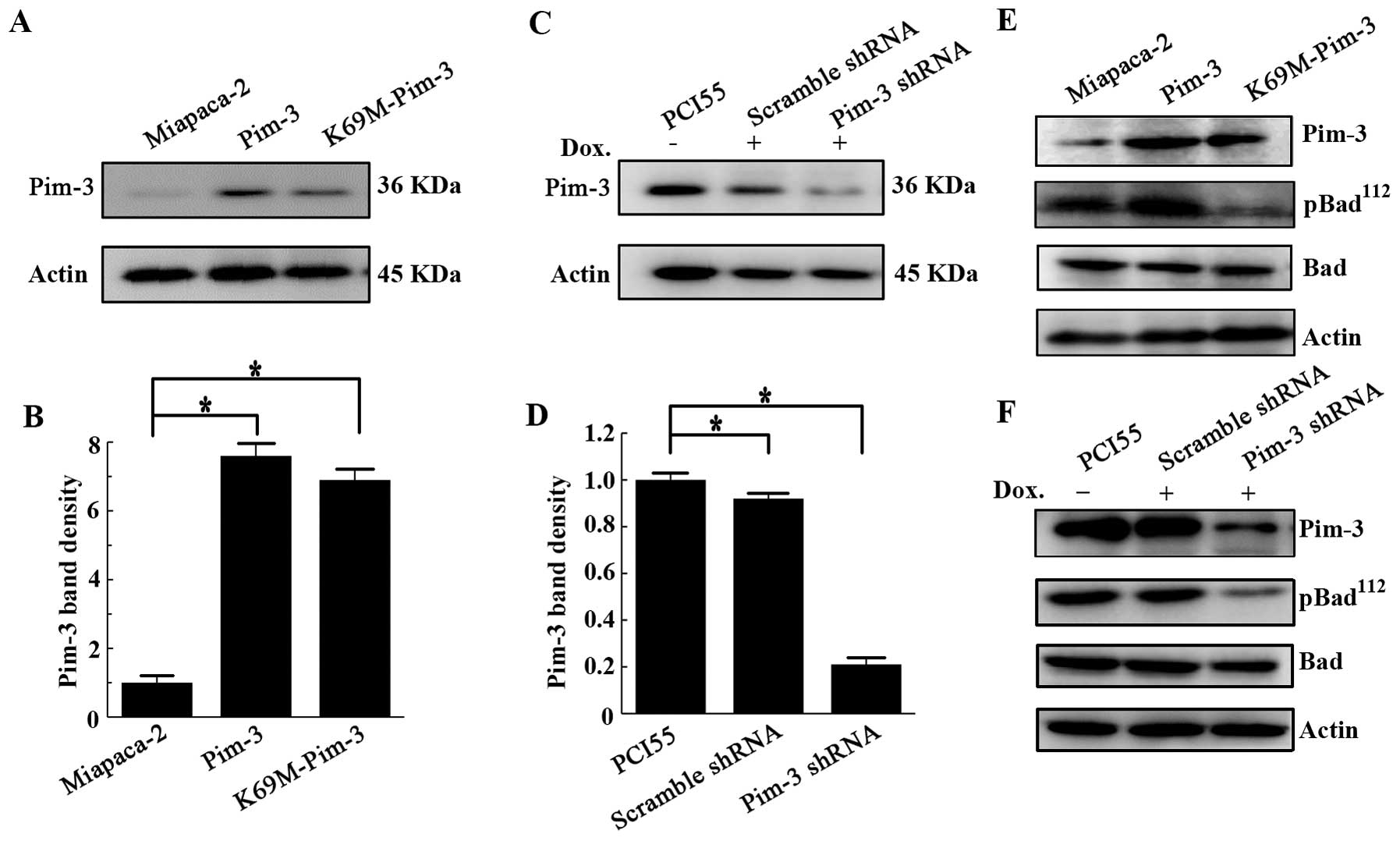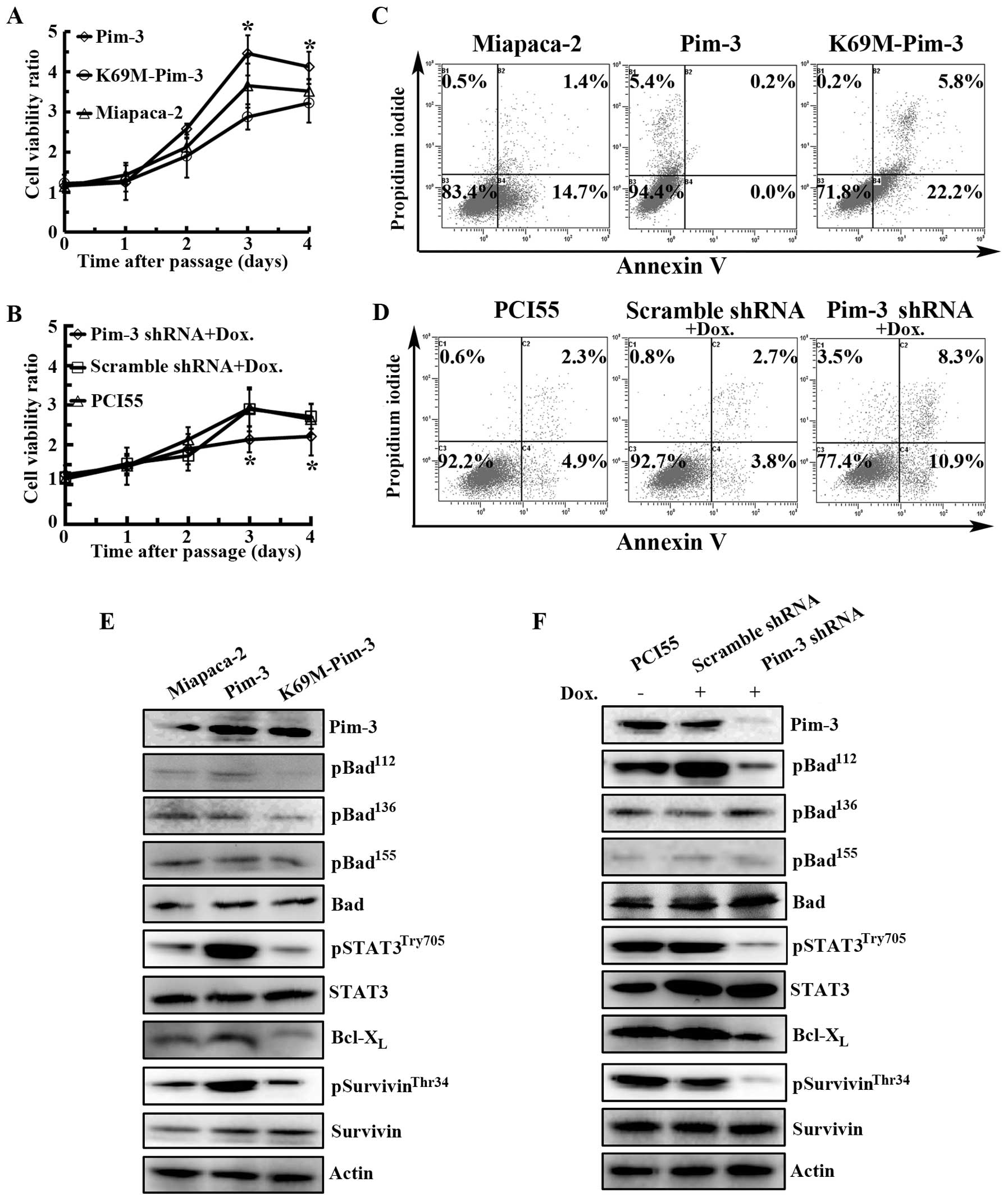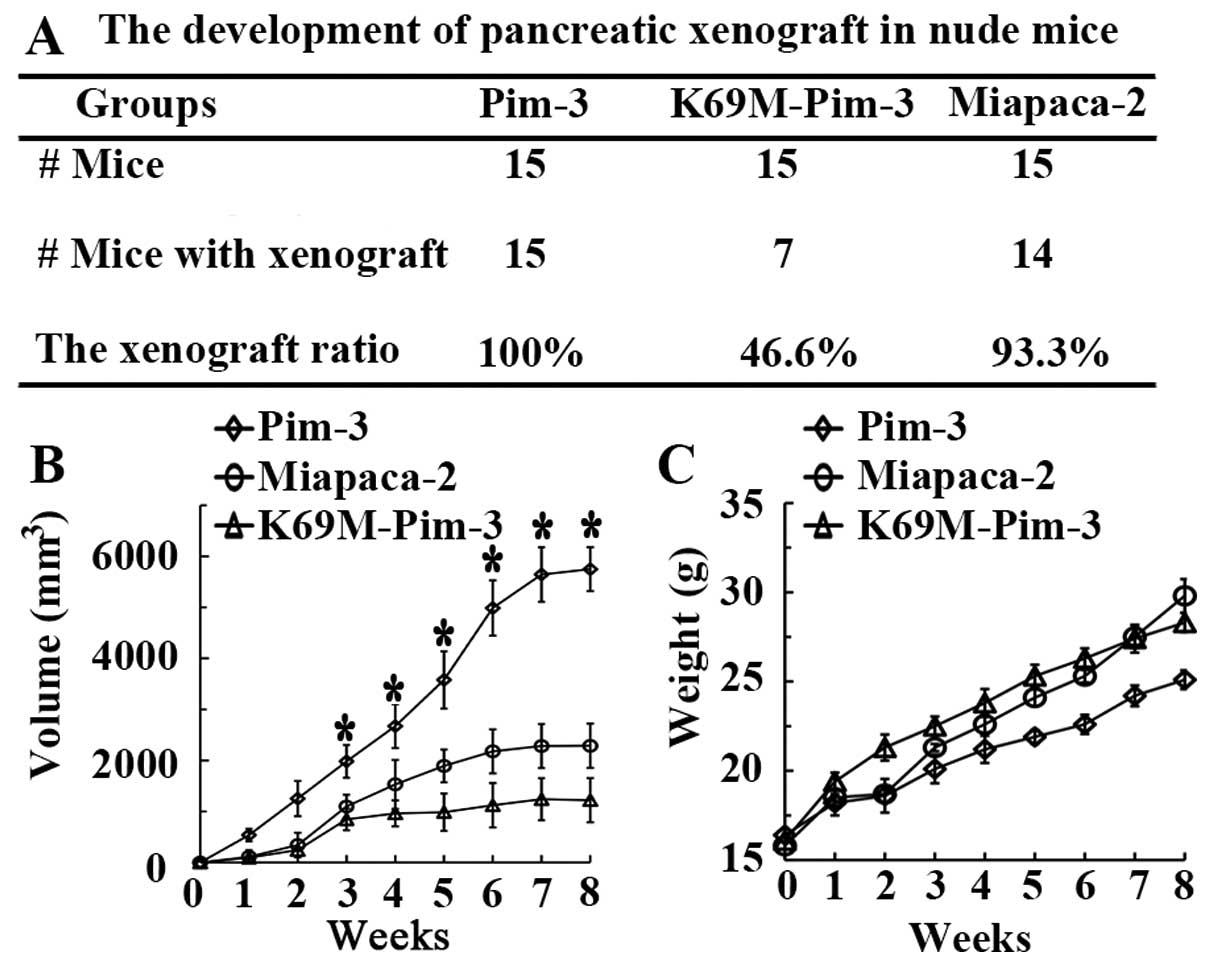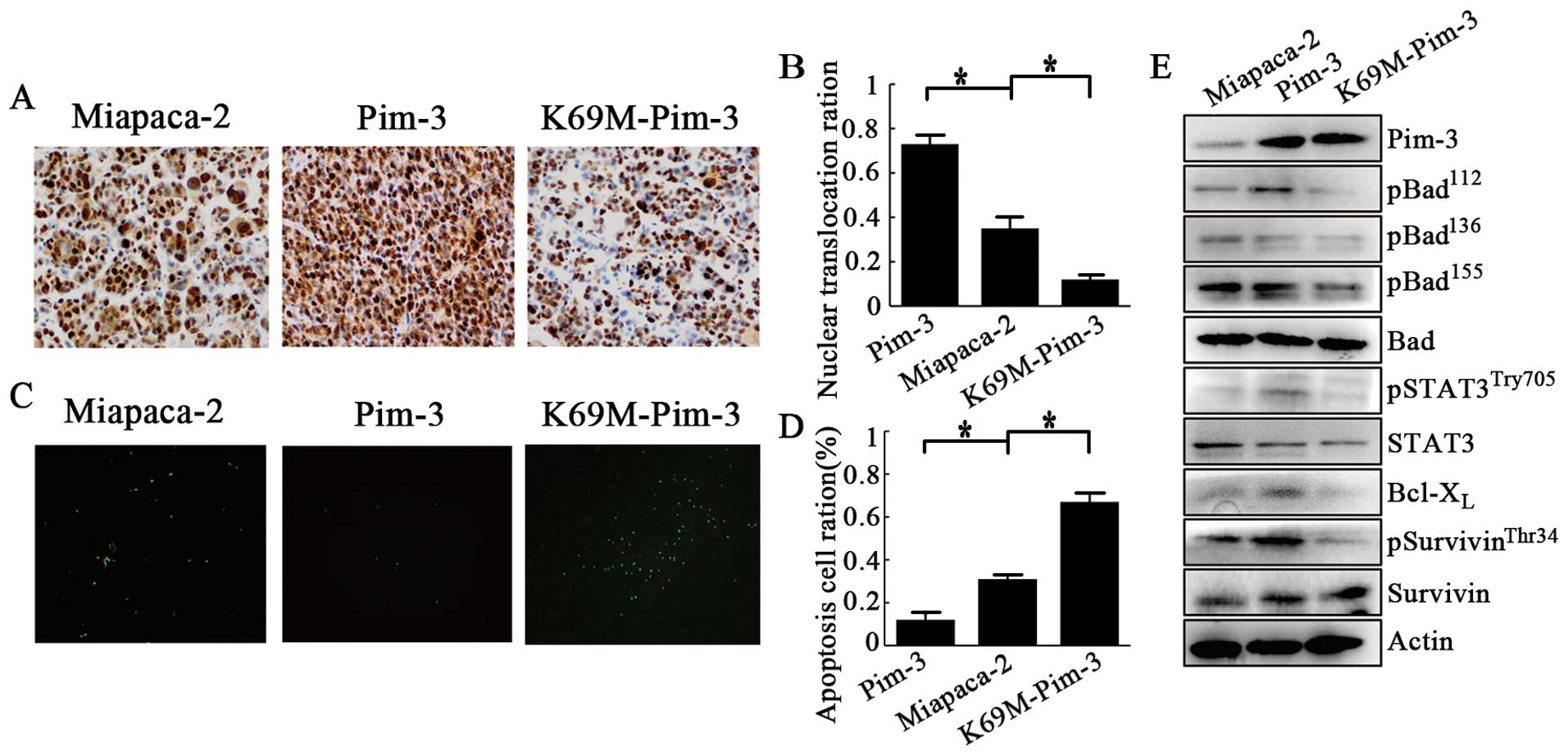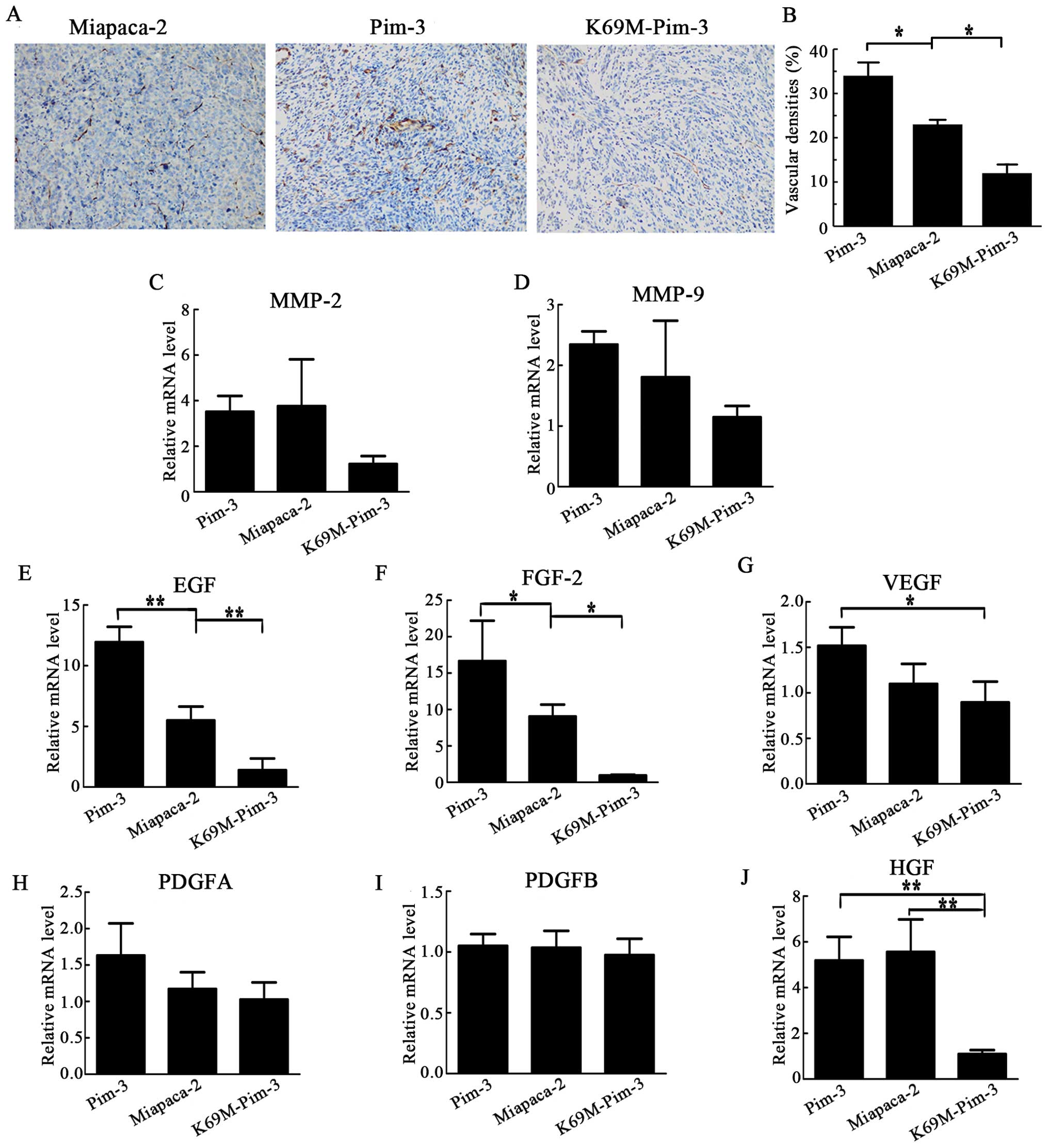|
1
|
Siegel R, Naishadham D and Jemal A: Cancer
statistics, 2013. CA Cancer J Clin. 63:11–30. 2013. View Article : Google Scholar
|
|
2
|
Winter JM, Cameron JL, Campbell KA, et al:
1423 pancreaticoduodenectomies for pancreatic cancer: a
single-institution experience. J Gastrointest Surg. 10:1199–1211.
2006. View Article : Google Scholar : PubMed/NCBI
|
|
3
|
Wang Z, Li Y, Ahmad A, et al: Pancreatic
cancer: understanding and overcoming chemoresistance. Nat Rev
Gastroenterol Hepatol. 8:27–33. 2011. View Article : Google Scholar : PubMed/NCBI
|
|
4
|
Chu D, Kohlmann W and Adler DG:
Identification and screening of individuals at increased risk for
pancreatic cancer with emphasis on known environmental and genetic
factors and hereditary syndromes. JOP. 11:203–212. 2010.PubMed/NCBI
|
|
5
|
Li D, Xie K, Wolff R and Abbruzzese JL:
Pancreatic cancer. Lancet. 363:1049–1057. 2004. View Article : Google Scholar
|
|
6
|
Vincent A, Herman J, Schulick R, Hruban RH
and Goggins M: Pancreatic cancer. Lancet. 378:607–620. 2011.
View Article : Google Scholar
|
|
7
|
Zavoral M, Minarikova P, Zavada F, Salek C
and Minarik M: Molecular biology of pancreatic cancer. World J
Gastroenterol. 17:2897–2908. 2011. View Article : Google Scholar
|
|
8
|
Li YY, Popivanova BK, Nagai Y, Ishikura H,
Fujii C and Mukaida N: Pim-3, a proto-oncogene with
serine/threonine kinase activity, is aberrantly expressed in human
pancreatic cancer and phosphorylates bad to block bad-mediated
apoptosis in human pancreatic cancer cell lines. Cancer Res.
66:6741–6747. 2006. View Article : Google Scholar
|
|
9
|
Feldman JD, Vician L, Crispino M, et al:
KID-1, a protein kinase induced by depolarization in brain. J Biol
Chem. 273:16535–16543. 1998. View Article : Google Scholar : PubMed/NCBI
|
|
10
|
Deneen B, Welford SM, Ho T, Hernandez F,
Kurland I and Denny CT: PIM3 proto-oncogene kinase is a common
transcriptional target of divergent EWS/ETS oncoproteins. Mol Cell
Biol. 23:3897–3908. 2003. View Article : Google Scholar : PubMed/NCBI
|
|
11
|
Fujii C, Nakamoto Y, Lu P, et al: Aberrant
expression of serine/threonine kinase Pim-3 in hepatocellular
carcinoma development and its role in the proliferation of human
hepatoma cell lines. Int J Cancer. 114:209–218. 2005. View Article : Google Scholar : PubMed/NCBI
|
|
12
|
Popivanova BK, Li YY, Zheng H, et al:
Proto-oncogene, Pim-3 with serine/threonine kinase activity, is
aberrantly expressed in human colon cancer cells and can prevent
Bad-mediated apoptosis. Cancer Sci. 98:321–328. 2007. View Article : Google Scholar
|
|
13
|
Zheng HC, Tsuneyama K, Takahashi H, et al:
Aberrant Pim-3 expression is involved in gastric
adenoma-adenocarcinoma sequence and cancer progression. J Cancer
Res Clin Oncol. 134:481–488. 2008. View Article : Google Scholar : PubMed/NCBI
|
|
14
|
Wu Y, Wang YY, Nakamoto Y, et al:
Accelerated hepatocellular carcinoma development in mice expressing
the Pim-3 transgene selectively in the liver. Oncogene.
29:2228–2237. 2010. View Article : Google Scholar : PubMed/NCBI
|
|
15
|
Zhang F, Liu B, Wang Z, et al: A novel
regulatory mechanism of Pim-3 kinase stability and its involvement
in pancreatic cancer progression. Mol Cancer Res. 11:1508–1520.
2013. View Article : Google Scholar : PubMed/NCBI
|
|
16
|
Yunis AA, Arimura GK and Russin DJ: Human
pancreatic carcinoma (MIA PaCa-2) in continuous culture:
sensitivity to asparaginase. Int J Cancer. 19:128–135. 1977.
View Article : Google Scholar : PubMed/NCBI
|
|
17
|
Yano T, Ishikura H, Kato H, et al:
Vaccination effect of interleukin-6-producing pancreatic cancer
cells in nude mice: a model of tumor prevention and treatment in
immune-compromised patients. Jpn J Cancer Res. 92:83–87. 2001.
View Article : Google Scholar : PubMed/NCBI
|
|
18
|
Wang YY, Taniguchi T, Baba T, Li YY,
Ishibashi H and Mukaida N: Identification of a phenanthrene
derivative as a potent anticancer drug with Pim kinase inhibitory
activity. Cancer Sci. 103:107–115. 2012. View Article : Google Scholar : PubMed/NCBI
|
|
19
|
Wang C, Li HY, Liu B, Huang S, Wu L and Li
YY: Pim-3 promotes the growth of human pancreatic cancer in the
orthotopic nude mouse model through vascular endothelium growth
factor. J Surg Res. 185:595–604. 2013. View Article : Google Scholar : PubMed/NCBI
|
|
20
|
Xu D, Cobb MG, Gavilano L, et al:
Inhibition of oncogenic Pim-3 kinase modulates transformed growth
and chemosensitizes pancreatic cancer cells to gemcitabine. Cancer
Biol Ther. 14:492–501. 2013. View Article : Google Scholar : PubMed/NCBI
|
|
21
|
Qian KC, Wang L, Hickey ER, et al:
Structural basis of constitutive activity and a unique nucleotide
binding mode of human Pim-1 kinase. J Biol Chem. 280:6130–6137.
2005. View Article : Google Scholar : PubMed/NCBI
|
|
22
|
Yang XY, Ren CP, Wang L, et al:
Identification of differentially expressed genes in metastatic and
non-metastatic nasopharyngeal carcinoma cells by suppression
subtractive hybridization. Cell Oncol. 27:215–223. 2005.
|
|
23
|
Byers LA, Sen B, Saigal B, et al:
Reciprocal regulation of c-Src and STAT3 in non-small cell lung
cancer. Clin Cancer Res. 15:6852–6861. 2009. View Article : Google Scholar : PubMed/NCBI
|
|
24
|
He M and Young CY: New approaches to
target the androgen receptor and STAT3 for prostate cancer
treatments. Mini Rev Med Chem. 9:395–400. 2009. View Article : Google Scholar : PubMed/NCBI
|
|
25
|
Kim DY, Cha ST, Ahn DH, et al: STAT3
expression in gastric cancer indicates a poor prognosis. J
Gastroenterol Hepatol. 24:646–651. 2009. View Article : Google Scholar : PubMed/NCBI
|
|
26
|
Scholz A, Heinze S, Detjen KM, et al:
Activated signal transducer and activator of transcription 3
(STAT3) supports the malignant phenotype of human pancreatic
cancer. Gastroenterology. 125:891–905. 2003. View Article : Google Scholar : PubMed/NCBI
|
|
27
|
Hirano T, Ishihara K and Hibi M: Roles of
STAT3 in mediating the cell growth, differentiation and survival
signals relayed through the IL-6 family of cytokine receptors.
Oncogene. 19:2548–2556. 2000. View Article : Google Scholar : PubMed/NCBI
|
|
28
|
Shirogane T, Fukada T, Muller JM, Shima
DT, Hibi M and Hirano T: Synergistic roles for Pim-1 and c-Myc in
STAT3-mediated cell cycle progression and antiapoptosis. Immunity.
11:709–719. 1999. View Article : Google Scholar : PubMed/NCBI
|
|
29
|
Aksoy I, Sakabedoyan C, Bourillot PY, et
al: Self-renewal of murine embryonic stem cells is supported by the
serine/threonine kinases Pim-1 and Pim-3. Stem Cells. 25:2996–3004.
2007. View Article : Google Scholar : PubMed/NCBI
|
|
30
|
Li YY, Wu Y, Tsuneyama K, Baba T and
Mukaida N: Essential contribution of Ets-1 to constitutive Pim-3
expression in human pancreatic cancer cells. Cancer Sci.
100:396–404. 2009. View Article : Google Scholar : PubMed/NCBI
|
|
31
|
Mackenzie GG, Huang L, Alston N, et al:
Targeting mitochondrial STAT3 with the novel phospho-valproic acid
(MDC-1112) inhibits pancreatic cancer growth in mice. PLoS One.
8:e615322013. View Article : Google Scholar : PubMed/NCBI
|
|
32
|
You W, Tang Q, Zhang C, et al: IL-26
promotes the proliferation and survival of human gastric cancer
cells by regulating the balance of STAT1 and STAT3 activation. PLoS
One. 8:e635882013. View Article : Google Scholar : PubMed/NCBI
|
|
33
|
Thoennissen NH, Iwanski GB, Doan NB, et
al: Cucurbitacin B induces apoptosis by inhibition of the JAK/STAT
pathway and potentiates antiproliferative effects of gemcitabine on
pancreatic cancer cells. Cancer Res. 69:5876–5884. 2009. View Article : Google Scholar : PubMed/NCBI
|
|
34
|
Chang M, Kanwar N, Feng E, et al: PIM
kinase inhibitors downregulate STAT3(Try705) phosphorylation. Mol
Cancer Ther. 9:2478–2487. 2010. View Article : Google Scholar : PubMed/NCBI
|
|
35
|
Talbot DC, Ranson M, Davies J, et al:
Tumor survivin is downregulated by the antisense oligonucleotide
LY2181308: a proof-of-concept, first-in-human dose study. Clin
Cancer Res. 16:6150–6158. 2010. View Article : Google Scholar : PubMed/NCBI
|
|
36
|
Sah NK, Khan Z, Khan GJ and Bisen PS:
Structural, functional and therapeutic biology of survivin. Cancer
Lett. 244:164–171. 2006. View Article : Google Scholar : PubMed/NCBI
|
|
37
|
Liu BB and Wang WH: Survivin and
pancreatic cancer. World J Clin Oncol. 2:164–168. 2011. View Article : Google Scholar : PubMed/NCBI
|
|
38
|
Diaz N, Minton S, Cox C, et al: Activation
of stat3 in primary tumors from high-risk breast cancer patients is
associated with elevated levels of activated SRC and survivin
expression. Clin Cancer Res. 12:20–28. 2006. View Article : Google Scholar : PubMed/NCBI
|
|
39
|
Kanwar JR, Kamalapuram SK and Kanwar RK:
Targeting survivin in cancer: the cell-signalling perspective. Drug
Discov Today. 16:485–494. 2011. View Article : Google Scholar : PubMed/NCBI
|
|
40
|
O’Connor DS, Grossman D, Plescia J, et al:
Regulation of apoptosis at cell division by p34cdc2 phosphorylation
of survivin. Proc Natl Acad Sci USA. 97:13103–13107.
2000.PubMed/NCBI
|
|
41
|
Wheatley SP and McNeish IA: Survivin: a
protein with dual roles in mitosis and apoptosis. Int Rev Cytol.
247:35–88. 2005. View Article : Google Scholar : PubMed/NCBI
|
|
42
|
Zhang Y, Park TS and Gidday JM: Hypoxic
preconditioning protects human brain endothelium from ischemic
apoptosis by Akt-dependent survivin activation. Am J Physiol Heart
Circ Physiol. 292:H2573–H2581. 2007. View Article : Google Scholar : PubMed/NCBI
|
|
43
|
Hanahan D and Weinberg RA: Hallmarks of
cancer: the next generation. Cell. 144:646–674. 2011. View Article : Google Scholar : PubMed/NCBI
|
|
44
|
Cao Z, Shang B, Zhang G, et al: Tumor
cell-mediated neovascularization and lymphangiogenesis contrive
tumor progression and cancer metastasis. Biochim Biophys Acta.
1836:273–286. 2013.PubMed/NCBI
|
|
45
|
Folkman J: Tumor angiogenesis: therapeutic
implications. N Engl J Med. 285:1182–1186. 1971. View Article : Google Scholar : PubMed/NCBI
|
|
46
|
Kalluri R and Zeisberg M: Fibroblasts in
cancer. Nat Rev Cancer. 6:392–401. 2006. View Article : Google Scholar
|
|
47
|
Carmeliet P and Jain RK: Molecular
mechanisms and clinical applications of angiogenesis. Nature.
473:298–307. 2011. View Article : Google Scholar : PubMed/NCBI
|
|
48
|
Johannessen TC, Wagner M, Straume O,
Bjerkvig R and Eikesdal HP: Tumor vasculature: the Achilles’ heel
of cancer? Expert Opin Ther Targets. 17:7–20. 2013.
|
|
49
|
De Bock K, Mazzone M and Carmeliet P:
Antiangiogenic therapy, hypoxia, and metastasis: risky liaisons, or
not? Nat Rev Clin Oncol. 8:393–404. 2011.
|















